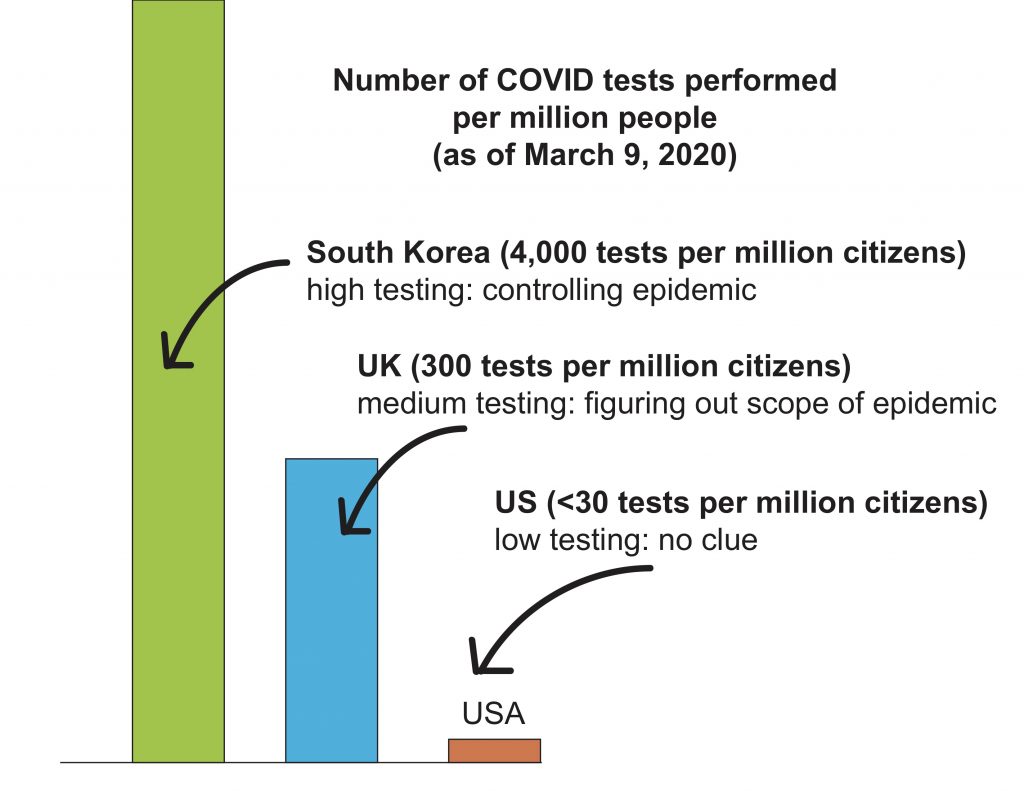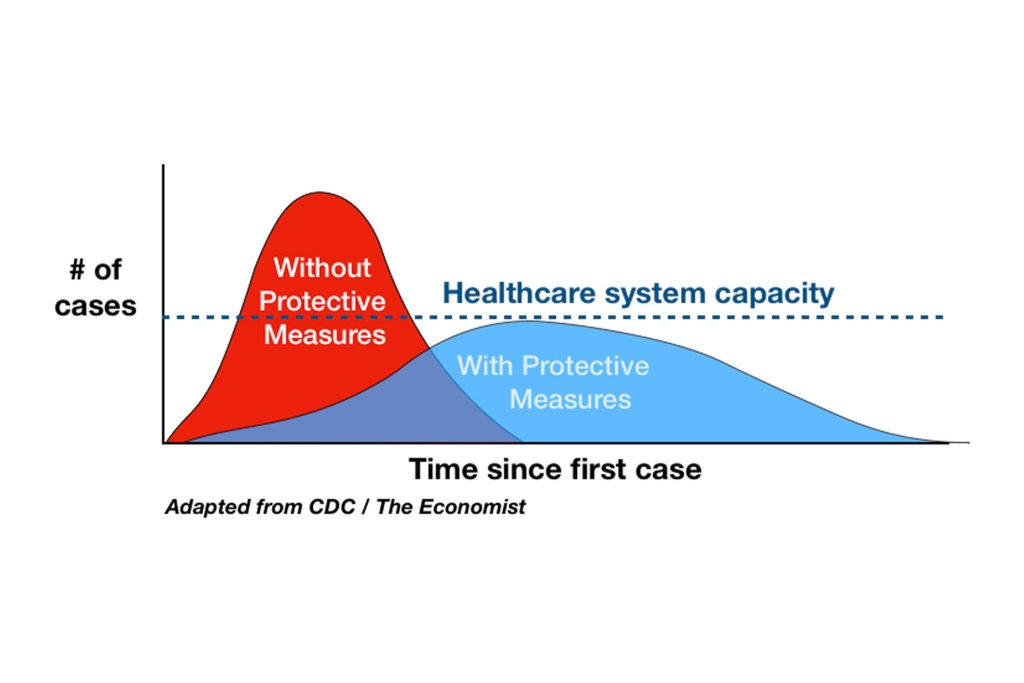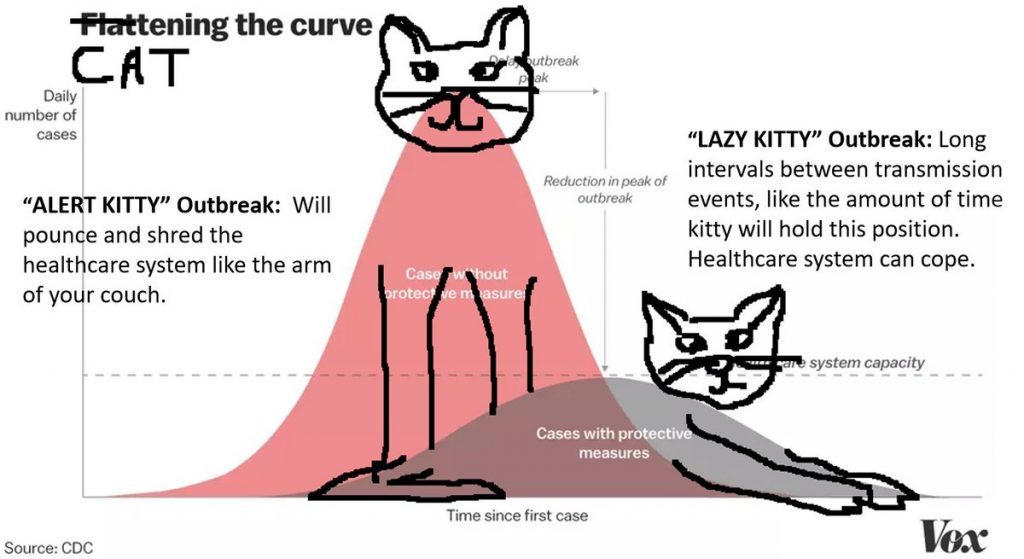Canceling big events
Week 11 (March 9-15)
Summary: COVID is more widespread than the numbers suggest. Waiting until you already have cases in your community before canceling large events will make your epidemic more intense and difficult to control. When you start flooding hospitals with sick people is when people really start dying.

(a) 𝐖𝐞 𝐡𝐚𝐯𝐞 𝐧𝐨 𝐜𝐥𝐮𝐞 𝐡𝐨𝐰 𝐦𝐚𝐧𝐲 𝐀𝐦𝐞𝐫𝐢𝐜𝐚𝐧𝐬 𝐚𝐫𝐞 𝐢𝐧𝐟𝐞𝐜𝐭𝐞𝐝 𝐰𝐢𝐭𝐡 𝐂𝐎𝐕𝐈𝐃. We are still woefully behind in testing for COVID. As of March 9, the UK has tested 18,000 people more than the US (26k vs 8k). That’s 15x more at a population level (per million citizens). Of 18 countries, the only ones the US ranks ahead of in testing are Vietnam and Turkey. We are driving blind. Individuals can’t make decisions about holding or attending events. Local leaders can’t make decisions about canceling schools. At these testing rates, by the time the virus is detected in a community, it’s probably already widespread and will be very difficult to stop.

(b) 𝐅𝐥𝐚𝐭𝐭𝐞𝐧 𝐭𝐡𝐞 𝐜𝐮𝐫𝐯𝐞. We’re not going to be able to stop COVID from transmitting. And if you start to run the numbers (say, 40% attack rate, and 10-20% hospitalized) and take inventory of the number of hospital beds, respirators, PPE in your state or community, you pretty quickly realize that we don’t have anywhere near the capacity for a full-blown COVID epidemic. Especially if healthcare workers are getting sick themselves.
Either act too early, or too late. Aggressive social distancing measures, even before there are confirmed cases, can slow the progression of the epidemic before it takes off. Americans are not particularly socialist by nature, but this is a case where individual sacrifices can collectively dampen the spike of an epidemic and save lives. Again, healthy people don’t need to seal themselves in their house. But be prepared for the cancelation of large events — concerts, sports events, political rallies, etc. I’ve been so impressed by the social consciousness of friends and family and the willingness to alter behavior, cancel plans, and think of the less fortunate. When local leaders and businesses start making very difficult decisions to cancel events, think about the 52 million Americans over age 65 and 133 million Americans with a chronic condition, and maybe resist the temptation to criticize. By the end of this, most of us will know someone who died of COVID, and in retrospect the sacrifices will seem small.

Credit: Anne Marie Darling @amdar1ing

I have a question. We’ve been told that many people are “self-quarantining†to ensure that they don’t unknowingly spread the Covid-19 virus. If I do that, and I don’t come down with it, good for me. BUT, that doesn’t clear me to return to society, because I’ll be among people who have not s-q’d. I could still receive it from someone else. What is the prudent thing to do?
Yes, right now everyone is recommend to exercise social distancing. ‘Self-quarantine’ sounds a bit more extreme, and more for people who actually have symptoms and are sheltering in place. But for the foreseeable future it makes sense for everyone to reduce settings where people congregate.
With schools closed and the talk of Social distancing with large groups-what about kids/teens getting together and hanging out or playing basketball outside? There is so much talk about avoiding large groups, but not a lot of instruction about normal day to day social interactions. My kids want to be able to hang out with friends and play outside. Or have friends come over to hang out. I am hesitant bc I feel like while the group may be smaller-there is still a risk. Also, living in a culdesac-the kids are wanting to play and run around. I have no problem saying no and having my kids annoyed with me for a while if it’s the safest thing to do. It’s just confusing bc the news talks about big groups and then says to hunker down. I’d love some advice about this. THANK YOU
The way I would explain it to my kid is that if one of the other kids they were playing with later test positive for COVID, all the kids they were playing with would need to self-isolate even more strictly due to their high risk of being infected, maybe not even leaving the home. And that would be far worse.
Your blog was sent to me in an email from my uncle, who seems to have received it from one of your relatives. I find your blog to be conveying very important information in a calming and friendly way, which I think would be helpful to a lot of people, especially many who still think this virus is a political hoax. Would it be OK with you if I shared the link to your blog on Facebook? I wanted to ask your permission because I don’t want to make you vulnerable to receiving hateful comments. Thank you for your work!
Absolutely. Please spread the word. I understand that more eyeballs means more comments of different varieties. But it’s important to get the word out.
Please add me to your list. Thank you.